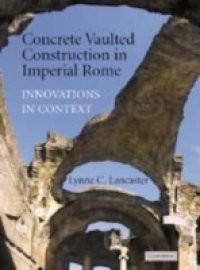Concrete Vaulted Construction in Imperial Rome examines methods and techniques that enabled builders to construct some of the most imposing monuments of ancient Rome. Focusing on structurally innovative vaulting and the factors that influenced its advancement, Lynne Lancaster also explores a range of related practices, including lightweight pumice as aggregate, amphoras in vaults, vaulting ribs, metal tie bars, and various techniques of buttressing. She provides the geological background of the local building stones and applies mineralogical analysis to determine material provenance, which in turn suggests trading patterns and land use. Lancaster also examines construction techniques in relation to the social, economic, and political contexts of Rome, in an effort to draw connections between changes in the building industry and the events that shaped Roman society from the early empire to late antiquity. This book was awarded the James R. Wiseman Book Award from the Archaeological Institute of America in 2007.

